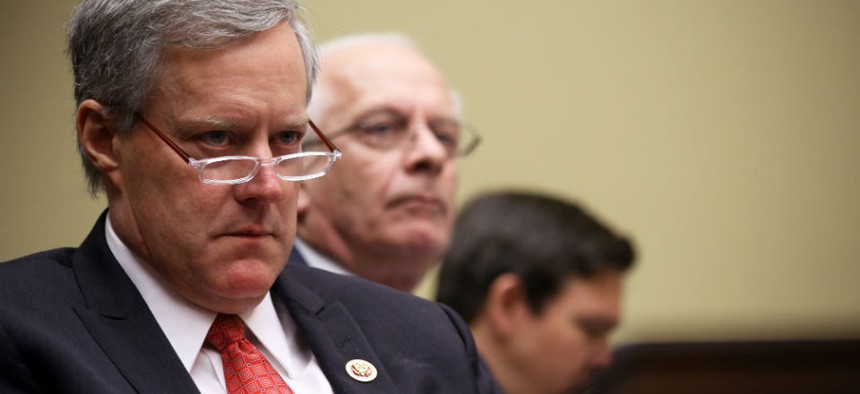
Mark Meadows, R-N.C., wants to streamline the way FOIA requests are handled. House Oversight and Government Reform Committee file photo.
FOIA Reform Draws Backing from Ex-Archives Ombudsman
Bill would codify powers of the office responsible for mediating disputes between requesters and agencies.
A bipartisan bill to codify a “presumption of openness” in the Freedom of Information Act process on Friday earned the blessing of a key former official at the National Archives and Records Administration.
Miriam Nisbet, founding and former director of the Office of Government Information Services, which was established in 2007 as a mediator between FOIA requesters and agencies, told the House Oversight and Government Reform Committee that the bill affirmed the office’s authority in ensuring FOIA compliance.
Subcommittee Chairman Mark Meadows, R-N.C., called the hearing to explore ways to streamline the handling of some 700,000 FOIA requests received annually. He cited “a lack of compliance and transparency” in holding agencies accountable for enforcing for citizens “the transparency that is the lifeblood of our democracy.”
Nisbet said her former office’s staff of seven provides both mediation services when requesters clash with agency FOIA officers as well as ongoing review of FOIA policies, procedures and compliance. Though it has encountered some resistance, by the end of fiscal 2014 the office had “assisted requesters and agencies in more than 3,500 FOIA-related instances, ranging from disputes over the application of a FOIA exemption, to helping requesters find the right place to send requests,” she said.
The bill, which has been introduced in both chambers, would make clear that Congress expects OGIS not only to review agencies’ policies, procedures and compliance, as the law currently states, but also to identify methods that improve compliance, including timely processing and how agencies assess fees. The bill also would ensure that “requesters are told that dispute resolution is an integral part of the FOIA process” as well as guarantee that OGIS is an independent “watchdog” or “overseer”—currently it is dependent on executive branch agencies for final reviews, said Nisbet, who retired last September.
Rep. Gerry Connolly, D-Va., a co-sponsor of the bill, noted that as a local official he was on the receiving end of FOIA requests for 15 years. He cautioned that “people say bureaucrats stonewall, but it’s not that simple. Sometimes the scope of the request is so broad, you would have to have huge truckload of documents to deliver it. We have to find ways to get requesters to limit the scope and be more precise.”
Frederick Sadler, a former FOIA officer with the Food and Drug Administration, noted that it cost the government $450 million to implement FOIA in fiscal 2013. He cautioned that requesters who meet resistance sometimes turn to litigation, which adds to the costs. (About 2 percent of request are appealed and fewer litigated, according to Nisbet.)
“Clearly, the statute is functioning well, in the main,” Sadler testified. “Equally as clear, there are concerns or problems with some requests and the application of policy when addressing these requests, but these have not been quantified and in my opinion, anecdotal data doesn’t represent the overall status, or success, of the program. Attempting to pass legislation to fix a problem without fully identifying the causes is akin to a physician prescribing a treatment without examining the patient.”
Rick Blum, speaking on behalf of news organizations in the Sunshine in Government Initiative, applauded the bill for including reforms his group had sought for years to reduce long waits for documents. “We are particularly supportive of ways to strengthen the Office of Government Information Services, overcome procedural challenges through better use of technology, and rein in secrecy statutes . . . that create anti-disclosure loopholes in the law.”
He cited agency-claimed exemptions that prevented the full disclosure of problems at veterans hospitals and the CIA withholding documents related to the 1961 invasion of Cuba at the Bay of Pigs, though all at the hearing agreed that some exemptions are needed for national security and financial regulation.
“The higher up the agency [the FOIA request is discussed] the better,” Blum said.
Correction: In the original version of this article, Frederick Sadler's name was misspelled.







